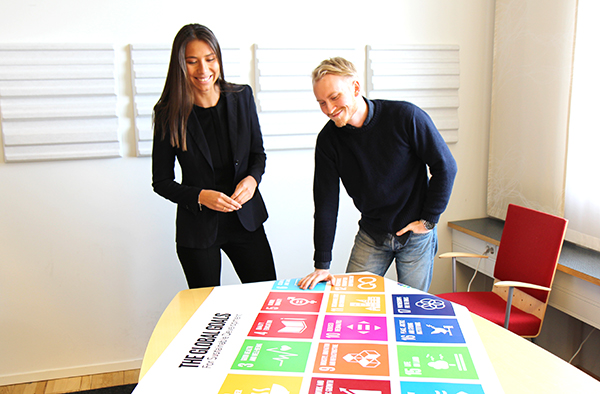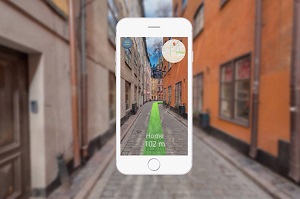Technology that helps when memory fails
MemoAR - Global Goal 3 & 16
Gradually it gets harder and harder to remember what you were planning to buy, where you put your wallet and to find your way home from the store. Today, 47 million people worldwide suffer from dementia, a number which is expected to almost triple by year 2050. Those affected by memory issues often become increasingly isolated as their day-to-day life becomes more difficult to manage. Using new technology, MemoAR want to make the world more accessible to people affected by memory issues.

The founders of MemoAr, Sabina von Essen, Henrik Waardahl and Gabriella Westman from the Media Technology Program and Tony Pepic from the Computer Science Program at KTH constitutes the core of MemoAR. What they all have in common is their interest in new technologies and to use it for the purpose of good. The team chose to focus on people affected by memory issues, and particularly on helping them navigate.
- We felt that we, by using modern technology, could help these people get a better life, says Sabina von Essen, CEO.
Today, society moves at a rapid pace, and the elderly often find themselves struggling to keep up. At the same time, they are independent people, often reluctant to ask for help in managing their day-to-day life. Using Augmented Reality technology, MemoAR can help people affected by memory issues regain their mobility, plan their days, and feel more secure.
By contributing to making society accessible to all, MemoAR also contribute to the United Nation’s Global Goals for Sustainable Development, primarily Goal 3, Good Health and Well-being, and Goal 16, Peace, Justice, and Strong Institutions.
- It’s common that the elderly become increasingly less mobile as they begin to struggle with memory issues, says Sabina von Essen. However, it’s hard, almost impossible, to create a society fully adapted to people with dementia. Therefore we choose to focus on making our existing society more accessible to this group. Our application makes it easier and more enjoyable for people with memory issues to navigate outside of their home, which enables us to contribute to creating an inclusive society, and decreasing social exclusion.

MemoAR creates a navigation app specifically tailored to people with memory issues. Using Augmented Reality, the app can help its users to find their way home or find their way to entirely new places. Currently, the app functions by using a simplified map on a smartphone, but in the future, they hope to integrate their technology into AR-glasses to make the tool even more discreet and accessible. Considering the fact that over 90% of people over 55 use glasses , they see huge potential when AR glasses become more common and people more used to the technology.
MemoAR has received support from KTH Innovation for around one year, and have just graduated from the pre-incubator program. Currently, they are working on testing and improving the app’s functionality and design, after launching a first version in the fall of 2017. Would you like to know more about MemoAR? On April 19th, they’re presenting their technology at Demensdagen.

